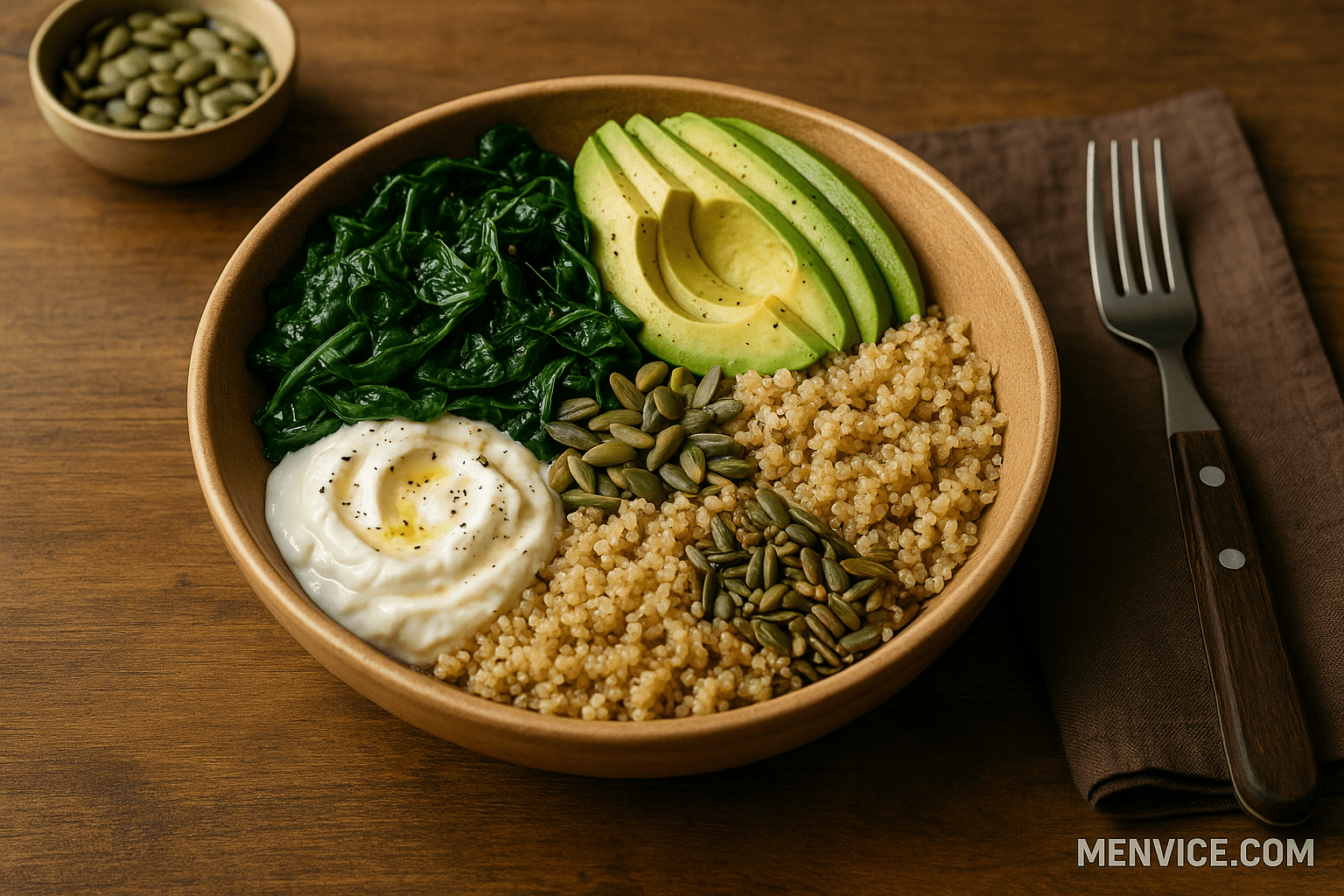
Elegance in Rebellion.
Own the Edge.
15 Magnesium-Rich Foods That Boost Sleep Quality, Reduce Stress, and Keep You Calm

There’s a quiet link between how you sleep, how you recover, and how steady your emotions feel — and it’s made of magnesium.
This mineral doesn’t get the same attention as protein or vitamin D, but it’s quietly running most of what keeps your body and mind balanced. From muscle recovery to mood regulation, magnesium is the mineral that helps your body exhale.
When it’s missing, you feel it — even if you don’t realize it.
Restlessness at night. Tight shoulders. Short temper. Constant fatigue. That background tension that never really leaves.
Those are all whispers of low magnesium levels.
The good news is that fixing it doesn’t require supplements or lab work.
The solution is in food — real, everyday food that doesn’t just fill you, but restores you.
Below are 15 magnesium-rich foods that not only help you sleep better and handle stress smarter — they also rebuild calm, one quiet meal at a time.
1. Dark Chocolate (70% or higher)
The easiest magnesium upgrade you’ll actually look forward to.
A 100-gram bar of dark chocolate (70% or above) contains about 60–65mg of magnesium, and it’s also loaded with antioxidants that lower cortisol — the stress hormone.
Why it matters: Magnesium helps your body produce serotonin, the chemical that stabilizes mood and supports deeper sleep.
Just one or two squares after dinner is enough.
✅ Pro tip: Choose chocolate with minimal sugar and no dairy fillers. Pair with almonds for a double magnesium hit.
2. Almonds
A handful of almonds gives you nearly 80mg of magnesium, along with vitamin E and healthy fats that protect your heart.
Why it works: Magnesium in almonds helps regulate the nervous system and muscle relaxation — key for post-gym recovery and better sleep quality.
✅ Best time to eat: 10–12 almonds between lunch and dinner to avoid evening energy crashes.
3. Pumpkin Seeds
Small but loaded — a tablespoon packs 35–40mg of magnesium, plus zinc, which supports testosterone production.
Why it works: Magnesium and zinc together improve melatonin levels, helping your body follow a natural sleep rhythm.
✅ How to use: Roast them lightly with olive oil and sea salt. Sprinkle over salads or yogurt.
4. Spinach
One cup of cooked spinach has 157mg of magnesium — among the highest of any common vegetable.
It also contains iron and folate, which keep energy steady through long days.
Why it works: Spinach replenishes magnesium lost through stress, caffeine, and sweat.
✅ Pairing idea: Add to omelets or smoothies in the morning.
5. Avocados
A medium avocado delivers around 58mg of magnesium, plus potassium and good fats.
Why it matters: These nutrients support cardiovascular health, muscle relaxation, and serotonin balance.
✅ How to eat: Smash on whole-grain toast with sea salt and a drizzle of olive oil.
6. Cashews
About 74mg of magnesium per 30g serving, plus tryptophan, which promotes melatonin (the sleep hormone).
Why it matters: Great for men who work long hours — magnesium calms the nervous system without sedating it.
✅ Pair it: Mix cashews and dark chocolate as a late-evening snack.
7. Bananas
Affordable, easy, and full of natural calm. Each banana provides 35–40mg of magnesium and vitamin B6, both of which help serotonin synthesis.
Why it works: The magnesium-potassium combo relaxes muscles and balances fluid retention.
✅ When to eat: Before bed if you often wake up with muscle cramps.
8. Tofu
Half a cup gives about 35mg of magnesium, plus plant-based protein.
Why it helps: Magnesium and protein together promote muscle recovery, especially for men doing resistance training or long commutes.
✅ How to cook: Stir-fry with spinach, soy sauce, and chili for a high-magnesium meal that tastes better than any supplement.
9. Yogurt (Greek or Plain)
One cup of plain Greek yogurt delivers 30–35mg of magnesium — along with probiotics that improve gut health and serotonin production.
Why it matters: A healthy gut communicates directly with your brain’s mood centers — which is why better digestion equals better calm.
✅ Use it: As a base for smoothies, dips, or snacks.
10. Whole Grains (Brown Rice, Oats, Quinoa)
One cup of cooked quinoa = 118mg of magnesium.
These grains stabilize energy and support recovery.
Why it matters: Magnesium helps convert glucose into usable energy, preventing the 3 p.m. fatigue crash.
✅ How to use: Rotate between quinoa for dinner and oats for breakfast.
11. Fatty Fish (Salmon, Mackerel, Tuna)
A 100-gram serving provides 50–60mg of magnesium, plus omega-3 fatty acids — the ultimate anti-stress duo.
Why it works: Omega-3s reduce inflammation and improve sleep quality by supporting magnesium absorption.
✅ Pro tip: Eat fish twice a week. It’s not about diet; it’s about rhythm.
12. Lentils and Chickpeas
Half a cup provides 35–50mg of magnesium, and both are excellent plant-based proteins.
Why it helps: The fiber in legumes slows down glucose spikes, reducing cortisol and anxiety symptoms.
✅ Use it: In soups, salads, or simple dal-chawal meals — magnesium doesn’t need fancy plating.
13. Seeds Mix (Sunflower, Flax, Chia)
Each tablespoon adds 40–70mg of magnesium and healthy fats that regulate mood.
Why it matters: Magnesium helps the brain’s GABA receptors — the same ones that slow your racing thoughts before sleep.
✅ How to use: Add a spoon to yogurt or oatmeal before bed.
14. Kale and Swiss Chard
One cup of cooked chard gives 150mg of magnesium, along with folate and potassium.
Why it helps: These greens neutralize stress hormones and support detoxification — great after caffeine-heavy days.
✅ Pairing: Toss with olive oil, lemon, and seeds for a simple dinner side.
15. Dates and Figs
Two dates or three dried figs give 30–40mg of magnesium and natural sugars for slow energy release.
Why it matters: Perfect for late-night snacking — magnesium relaxes muscles, and the sugar helps tryptophan reach your brain faster.
✅ Pro tip: Dip in almond butter for a nutrient-packed dessert.
What Magnesium Actually Does for You
Magnesium powers over 300 biochemical processes in the body — everything from ATP (energy production) to serotonin regulation.
It’s also deeply tied to testosterone, heart health, and recovery.
A 2022 review from the Journal of Nutrition & Metabolism found that men with higher magnesium intake showed improved sleep quality and lower levels of anxiety and inflammation.
It’s not hype. It’s science quietly working for your nervous system.
How to Eat for Calm: A MenVice Routine
You don’t need complicated diets — just structure.
- Morning: Smoothie with banana, spinach, Greek yogurt, and chia seeds.
- Lunch: Brown rice with chickpeas and greens.
- Snack: Almonds or pumpkin seeds.
- Dinner: Salmon, quinoa, and sautéed spinach.
- Night: Dark chocolate, cashews, and dates.
That’s over 350mg of magnesium naturally — without supplements or powders.

The MenVice “Calm Bowl”
Ingredients:
- ½ cup quinoa
- 1 cup sautéed spinach
- 1 sliced avocado
- 1 tbsp pumpkin seeds
- 1 tbsp sunflower seeds
- ½ cup Greek yogurt
- Olive oil, sea salt, black pepper
Method:
Layer quinoa and spinach in a bowl. Add avocado, sprinkle the seeds, and drizzle olive oil. Serve with Greek yogurt on the side.
It’s simple, nutrient-dense, and actually tastes like calm.
Magnesium, Sleep, and Strength
When your magnesium levels are balanced, everything feels smoother.
Your workouts recover faster. Your patience lasts longer. Your sleep stops feeling like a chore.
That’s the difference between being tired and being restored.
And it doesn’t come from another energy drink — it comes from a mineral that’s already in your body, waiting to be refilled.
Feed it right.
Sleep deeper.
Think clearer.
Stay steady — the way MenVice men do.






